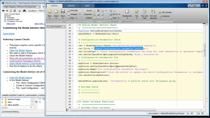Modeling Standards Compliance
Modeling standards are a set of guidelines for developing, maintaining, and documenting models used in the development of production software. These guidelines are created by international standards organizations or industry working groups such as the MathWorks Advisory Board based on years of experience and best practices. Compliance with modeling standards helps you improve project results by ensuring design consistency across teams and suppliers, improving model readability, enabling simulation and testability, and improving the results from code generation.
Simulink Check™ helps you automate manual checks by assessing modeling standards compliance:
- Edit-time checks highlight issues when they are introduced so that you can fix violations as you go and avoid costly rework later.
- Model Advisor provides a guided workflow for running preconfigured checks for popular industry standards (such as ISO 26262 and DO-178) or custom checks defined by you and your team.
- Recommended actions and auto-fix options help you address the issues flagged by the analysis. Justify a violation by adding a rationale for why it can exist.
- Model Advisor results can be published in comprehensive reports and shared with your team.
The process of checking modeling standards compliance helps you fix design issues early and improve model quality, understanding, and reuse so that you can achieve your development and certification goals.
Published: 16 Nov 2022
Once you have developed a model in Simulink, how do you know if it has design issues that can prevent you from meeting your development and certification goals?
To identify and fix these issues early in the process, you can check if your design complies with modeling standards, a set of guidelines for developing, maintaining, and documenting models used in the development of production software. These guidelines are created by international standards organizations or industry working groups such as the MathWorks Advisory Board based on years of experience and best practices.
Compliance with modeling standards helps you improve project results by ensuring design consistency across teams and suppliers, improving model readability, enabling simulation and testability, and improving the results from code generation.
Manually reviewing the model and checking for compliance issues is time-consuming. Reviewers should focus on the design itself rather than the details of model construction.
Simulink Check is a tool that helps you automate manual checks by assessing modeling standards compliance.
When you are editing a model, edit-time checks highlight issues when they are introduced, just like a word processor highlights spelling or grammar errors. You can fix violations as-you-go and avoid costly rework later.
To systematically check your model against one or several groups of checks, Model Advisor provides a guided workflow for you to run preconfigured checks for popular industry standards, such as ISO 26262 and DO-178.
You can also create and run custom checks from standards defined by you and your team.
After the analysis is complete, you can find recommended actions to help you address the issues. For some issues, you can use an auto-fix to address it within the Model Advisor. If the analysis detects a violation that you or your team have already determined is ok to have, you can justify it by adding a rationale for why it can exist.
Reports on modeling standards compliance are often required for design reviews or for audit purposes. Model Advisor results can be published in comprehensive reports and shared with your team.
The process of checking Modeling Standards Compliance helps you fix design issues early and improve model quality, understanding, and reuse so that you can achieve your development and certification goals.




